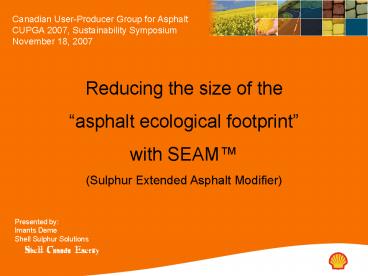Imants Deme - PowerPoint PPT Presentation
1 / 30
Title: Imants Deme
1
Canadian User-Producer Group for Asphalt CUPGA
2007, Sustainability Symposium November 18, 2007
Reducing the size of the asphalt ecological
footprint with SEAM (Sulphur Extended Asphalt
Modifier)
Presented by Imants Deme Shell Sulphur
Solutions Shell Canada Energy
2
Contents
- Sulphur-Extended Asphalt history
- SEAM properties and use
- Health, safety and environment
- SEAM technology (40/60 SEAM/bitumen
semi-rigid pavements) - - Bitumen reduction
- - Road performance properties
- - Road design
- The green page
- Examples of applications
3
SEAM history
4
Historical perspective
Pelletized sulphurwith dispersing agent, H2S
scavenger plasticizer Sulphur-Extended Asphalt
Modifier SEAM
Liquid sulphur High shear mixer No H2S
scavenger no plasticizer
5
SEAM properties and use
6
SEAM Properties
- Solid pellet at ambient temperatures (lt5 mm)
- Easy to add to asphalt hot-mix
- Melts quickly in hot-mix
- Can be stored on ground or in silos
- Additive advantages
- - disperses sulphur in bitumen
- - reduces odour gas emissions
- - plastification agent
7
Health, safety, environment
8
SEAM Mix Fume Emissions (Six Hour Average)
2
1
ASPHALT HOT-MIX PLANT H2S SO2 0 AT MIXER AND
TRUCK LOADING AREA (SHOWN BY ARROW)
ASPHALT PAVER H2S
S02 ABOVE SCREED (1) 0.9 PPM
0 PPM OPERATOR PANEL (2) 0.1 PPM 0.3
PPM AVERAGE LIMIT (2002 TLV) 10 PPM 2
PPM
INDUSTRIAL HYGIENIST CONCLUSION NO BREACH OF
COMPLIANCE FOR EMPLOYEE EXPOSURE
9
Stack emissions not increased
Gencor Plant, 300 tph capacity
Conclusion No significant difference in SO2
H2S emissions and lower hydrocarbon emissions for
SEAM mix
10
VOC reduced by 50
SUMA vacuum canisters used in study
11
SEAM technology
- Bitumen reduction
- Strength properties
- Road design
12
13
SEAM PG Performance based on Marshall
SEAM addition to asphalt mix increases Marshall
Stability and has the same effect as using
modified bitumens which are from 1.8 to 3.6 PG
grades higher
PG70-22 SEAM
?
PMA
PMA
In semi-rigid mix (40SEAM/60Bitumen)
14
Marshall Stability 2-3 PG grade increase
300/400 200/30 150/200 80/100
59 Pen PMB PMB
15
APA Wheel Rutting (After 8000 wheel passes)
16
SEAM modulus is less temperature sensitive
Temperature, ?C
17
Thick SEAM pavements may prolong road life
msa millions standard axles
Asphalt or SEAM Pavement thickness
300mm gran. base sub-base
sub-base sub-base
Predicted road life increases with pavement
thickness SEAM may provide exceptionally longer
road lives when used in thick pavements
18
Restrained Specimen (TSRST) Cooling Test
MIX PG52-34 SEAM COOLING RATE -10 ?C/h
19
Addition of SEAM to asphalt mix does not change
pavement resistance to cracking at low
temperatures
PG46-34 PG52-34
PG58-28 PG64-22
PG58-28 300/400
200/300 150/200
80/100 80/100
NB Mix cracking temperature within 2.4 C of
bitumen PG low temperature value
20
Uses for which SEAM is particularly suited
- Heavy duty use heavy duty pavements, high
traffic intersections, bus lanes, truck climbing
lanes, truck terminals, airfields, container
terminals - Upgrades quality of mixes made with poor
aggregates - - Rut resistant mixes from fine-graded (sandy,
marginal) aggregates - - Aggregate conservation reduces amount of
stone required to be crushed to make angular
fines (important in aggregate-scarce areas) - - Safeguard against premature rutting for
pavement sections which were under-compacted
during construction - The combination of high rut resistance, constant
stress fatigue resistance (road life) higher
modulus (load spreading), makes SEAM mixes
particularly suitable for thick long life
perpetual pavement designs - Prevents pavement cracking in cold climate areas
without compromising resistance to rutting of
pavements - Improves performance of mixes made with poor
quality (e.g. waxy) bitumens (i.e.resistance to
rutting and cracking)
21
The Green Page Advantages from SEAM use
- Energy Cost Saving (approx. 5 direct 11
indirect) - - Less bitumen to heat
- - Lower mix temperature (ie. 1/3 way to warm
mix) - - Lower plant fuel consumption
- - Significantly lower fuel consumption relative
to PMA - Conservation of Hydrocarbon Resources
- - Conserves fuel bitumen
- Conservation of Aggregate Resources
- - Permits use of fine-graded (marginal, sandy)
aggregates - - Stability of sand-asphalt mixes increased
significantly - Environment
- - Reduces VOCs (volatile organic constituents)
- - Use in roads provides sulphur producers with a
sustainable application for unmarketable sulphur
- - Provides a carbon credit (bitumen
reduction/lower energy, etc.)
22
Summary of SEAM-specific issues
- Feeder required for adding SEAM pellets
accurately - Strict temperature control is required during
SEAM mix processing - SEAM mixes emit more odor, fumes, and eye
irritant than conventional asphalt mix during mix
placement - (NB SEAM use complies with regulatory
exposure requirements) - More difficult to recycle hot
23
High stress intersection
Storage terminal parking lot
Vancouver, Canada
24
Las Vegas, USA SEAM wearing base course
25
Port of Oakland, California 300mm SEAM pavement
26
Yunnan, China Tollway SEAM base course with SMA
top course
Nantong Port, China storage terminal
27
Kazakhstan SEAM pavement
28
Saudi Arabia SEAM test road
29
Reducing the size of the asphalt ecological
footprint
30
Calgary, Canada SEAM wearing course































